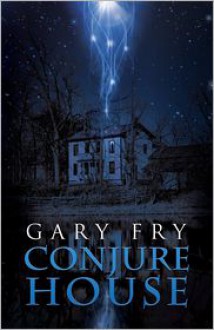
In what feels like a much older novel than it is, Conjure House offers up a solid, old-fashioned horror novel story, the kind where the real horror always seems to be just off the margins of the page. Gary Fry establishes each scene beautifully, engaging the reader's imagination so well that it's often a surprise to look back and realize just how sparse the details are upon the page, when they're so vivid and vibrant in the mind's eye. It's a neat narrative trick, and one that's not easy to pull off, but it really serves to draw you deeper into the story.
Horror novels are often a bit odd, requiring a kind of patience that we, as readers, don't extend to other genres. We're generally willing to sit back and let the author establish the scene, foreshadow the real horror, and build up the suspense before finally allowing our fears to escape. Here, however, we get two of the strongest opening chapters I've read in a horror novel in quite some time. By the time we're through them, we already have the background we need to appreciate the horror, some sympathy for the protagonist, and a burning desire to find out what's really going on behind the doors of the Conjure House.
Fry makes use of a lot of the standard elements of the genre here, including a haunted house; the tormented, secretive father; the sensitive, somewhat prescient mother; the child who is surprisingly mature for his age; and the small circle of childhood friends who have scattered over the years, but who immediately return home to put the past to rest. Anybody who has ever read a Stephen King or Dean Koontz novel knows the formula, and also knows that formula can work very well, with enough inspiration and talent behind it. Even if Fry doesn't quite pull it off, there's enough imagination and ingenuity here to justify the attempt.
The pacing lags a bit in the middle of the book, as old friends are brought back together, but there are enough eerie, creepy, unsettling glimpses of the true horror embedded in their journeys to keep the reader close. Unfortunately, Anthony and his family dynamic is the weakest part of the story, and the lack of likability/sympathy does keep the novel from achieving the full impact of its potential. As for the mystical mumbo-jumbo of the Conjure House, the philosophical concepts of folding time, and the Lovecraft inspiration behind it all . . . well, it's a big heavy-handed for such a short novel, and probably a bit too intangible for some readers. I didn't particularly buy it, and didn't find it lived up to the atmosphere Fry created, but I did find it a nice alternative to the typical religious/spiritual conflict of good and evil.
Overall, it's a good book . . . a solid read . . . and a nice addition to the genre. I doubt I'll have any strong memories of it a few weeks or months from now, but I am curious to give Fry another read, and have no hesitation in recommending this to fans of the genre.
Originally reviewed at Beauty in Ruins


 Log in with Facebook
Log in with Facebook 





